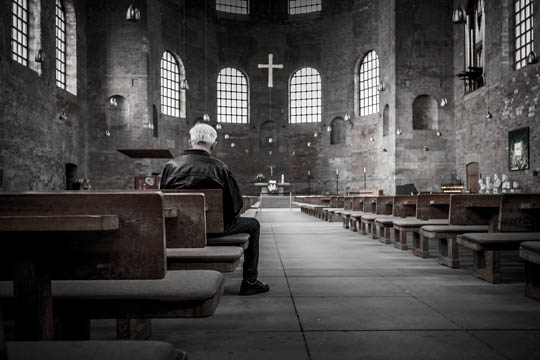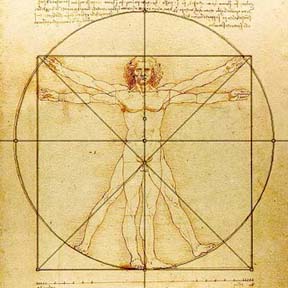May 2020
|
| |
The Holy Cutting Spirit
At the end of his time on earth, Jesus had 120 followers
(Acts 1:15), but after Peter’s first sermon, over 3000
joined the church (Acts 2:41). What made the difference?
It was the Holy Spirit (Acts 2:33). He made the
difference. And he did it by cutting into the hearts of
those who heard Peter preach (Acts 2:37). That cutting
devastated them. It leveled them. It drove them to
repentance – and the new life that forgiveness brings on
its heels (Acts 2:38, 1 Corinthians 14:24–25). Later the
same boom was lowered on Saul of Tarsus (Acts 9:4).
Jesus warned about this coming cutting (Hebrews 4:12) –
with its three sharp blades –
conpuncti corde,
in the old Latin Bible. First, this cutting brings the
condemnation of sin because we won’t believe. Next, it
condemns our self-importance by proclaiming that only
God is righteous. And last, it condemns the world for
loving the devil (John 16:9–11). All three are finely
nuanced, but basically they’re the same – they all
attack our perversion and crookedness (Matthew 17:17,
Philippians 2:5).
Initially there was a good response (Matthew 13:20–21),
but soon no one wanted anything to do with the church
any more (Acts 5:13, Romans 3:11). That brings us back
from thousands to the little flock made up of two or
three (Luke 12:32, Matthew 18:20). That’s because only a
few are finally chosen to endure to the end (Matthew
22:14, 10:22). Why not more? It’s because Christianity
is too tough (Matthew 7:14). It brings hatred from the
very world we’re trying to live in – because we undercut
its dominant value system (John 15:18–19, 1 John
2:15–17, James 4:4).
But wait! Christians haven’t put up with this. No, they
have instead forever been tearing down these words to
make Christianity easier, so that more will jump aboard
the gravy train of grace (Luke 12:19) – ostensibly to
fulfill the great commission (Matthew 28:19–20). Beware
of them and pray at Pentecost, on May 31, that God’s
Holy Spirit, that sharp sword of old, will cut them up
for trying this – and then return them to the narrow,
difficult way of Jesus (Matthew 7:14, 2 Corinthians
6:1).
Pastor
Marshall
|
|
| |
|
President’s Report…
by Cary Natiello
God’s
blessings to you all and happy belated Easter.
As you know First Lutheran Church of West Seattle
continues to suspend worship services including missing
Holy Week and Easter.
During this time I spoke frequently with Pastor
Marshall trying to come up with possible workarounds to
the Stay-at-Home order and the prohibition on
gatherings.
But each attempt was squashed because preventing the
spread of COVID-19 and the safety of our congregation
continued to be paramount.
Let’s pray that this pandemic will become a thing
of the past so we can worship together once again.
From one of my conversations with Pastor Marshall
he referenced
Psalm 46:10… “Be
still, and know that I am God…!”
Pastor Marshall explained that while we cannot
worship together he used these words
to stand
silently before God and his Word – and its elaborations
in prayers, hymn texts, art works, and sermons.
I found a similar verse from
Zechariah 2:13… “Be
silent, O all flesh, before the Lord: for he is raised
up out of his holy habitation.”
I found these words comforting while we are being
prevented from worshiping together.
In Pastor Marshall’s April 10, Online Good Friday
Liturgy there is a short article,
Sickness
According to the Bible where Pastor Marshall
explains how
God “punishes us with his ‘four sore acts of judgement’
– war, famine, wild beasts, and disease (Ezekiel
14:21).” (I
also found
Colossians 3:5-6 which describes
why God
punishes us.
“Put
to death therefore what is earthly in you:
sexual immorality, impurity, passion, evil desire, and
covetousness, which is idolatry.
On account of
these the wrath of God is coming.”)
Pastor Marshall continues…“Our sufferings from
disease…are but a drop when compared to the ‘ocean of
God’s benefits on which we should expatiate with divine
rhetoric’ (LW 3:343)…Let us therefore gird up our loins
and ‘graciously accept all kinds of sickness’ and arm
ourselves with the Word of God, practice faith, and
‘acquire a food that will not perish (John 6:27).’”
While
I found
these words instructive at a time with so much
uncertainty, they got me to thinking – why?
Why is God using COVID-19 to punish the world in
this
instance?
Obvious reasons are mentioned above,
sexual immorality, impurity, passion, evil desire, and
covetousness, but, could it also be more specific
to the present, unique to our day?
So, I thought about that question. What else
could be important to God right now?
I learned recently that scientists
have been warning about catastrophic pandemics for
years, but their alarms went unheard and now we know how
little was done to prepare for the inevitable.
I also learned that world pollution has
been greatly diminished due to COVID-19.
“Global
carbon emissions from the fossil fuel industry could
fall by a record 2.5bn tonnes this year, a reduction of
5%, as the
coronavirus pandemic
triggers the biggest drop in demand for fossil fuels on
record.”
Could COVID-19 be God’s way of telling our world leaders
to listen to our scientists when they sound the alarm
that the sky is falling (e.g., pandemics and global
warming), and
realize that yes,
the sky really is falling rather than dismiss them as
Chicken Littles?
Is God
telling us to take better care of our planet or He will
do it for us!?
Is God showing our world leaders that they must
work in
cooperation rather than isolation to combat things like
global pandemics and climate change (and maybe if they
did,
it could also lead to a more peaceful coexistence
throughout the world)?
Is it possible that God is using COVID-19 to send
us these messages?
Well, we will never know God’s true intentions
but we can meditate about them.
So, while we cannot worship together as a
congregation with songs, readings, sermons, communion,
and sharing God’s peace, we can take comfort in our
silence before God and his Word, and ponder what God is
trying to convey to us when he sends us a disease like
COVID-19.
FIRST QUARTER 2020
is off to a solid start financially, continuing the
trend we set in 2019.
I would like to express my sincere gratitude to
our congregation for their ongoing relentless financial
support of our church.
Thanks be to God.
Here
are the numbers:
Year to
date through the first quarter of the year, total giving
was $68,053 versus target of $58,750, meaning we are
$9,250 ahead of the giving target needed to meet our
budget through three months of the year.
Average weekly
giving through the first quarter was $5,235, or $715 per
week higher than we need to fully fund our budget.
Total general
budget income was $87,622 versus a target of $77,318
through March, putting the overall income target
$10,300 above budget through March.
On the balance sheet, the Endowment Fund declined
to $271,062 as of March 31, seeing just under a 16%
decline for the first quarter of 2020.
Q1 2020 was the
worst quarter in the history of the S&P 500 and the Dow
30 indexes, including the entirety of the Great
Depression (1929-1940s) and the Great Recession
(2007-2009).
Our Endowment Fund having only a 16% decrease is
in part because at the start of the year we increased
our bond weighting as a
percentage of our total endowment fund assets which
helped our relative performance in the first quarter.
The fund's balance as of Easter Sunday increased
to just over $283,000.
SAVE THE DATE:
God
willing, our midyear congregational meeting is
preliminarily set for August 2, 2020 following the 10:30
service.

|
|
| |
|
Sunday Worship
― online at www.flcws.org
|
Psalm 46:10 for Now
Introducing Our Online Liturgies
by Pastor Marshall
In lieu of our time together due to the stay-at-home
orders issued by our government, because of the
coronavirus troubles – which have put our worshiping,
studying and serving in abeyance – I offer these
abbreviated online liturgies. They in no way are
equivalents to our normal fare. But they still have
value. In them I’m taking advantage of our time apart to
accentuate Psalm 46:10 about being silent before God.
These liturgies have no audio tracks or video streams –
which in Mendocino County, California, have been banned
(Doug Mainwaring, “California County Bans Singing in
Online Worship Services,” LifeSites, online,
April 17, 2020). So what we have here are just words.
Providing instead a full mock worship service online
would be inconsistent with our mission statement and the
honor it pays to historical liturgies (which require a
congregation present). The liturgies I provide are
short, meditative in tone, and solitary. Use them to
stand silently before God and his Word – and its
elaborations in prayers, hymn texts, art works, and
sermons. Luther thought God has his way with us in this
silence (Luther’s
Works 6:35). Kierkegaard agreed, seeing in this
silence God’s Word gaining power over us (For
Self-Examination, ed. Hongs, p. 47). He even
thought, somewhat humorously, that by blunting our
“loquacity” through this silence, God’s ways were
protected from any “undietetic uncircumspection” coming
from us (The Book
on Adler, ed. Hongs, p. 166). Be that as it may, we
must never forget, as Kierkegaard elsewhere warned, that
Christianity is not primarily for quiet times, but for
slugging it out “right in the middle of actual life and
weekdays” (Journals,
ed. Hongs, §2:2132).
|
|
| |
|
ANNOUNCEMENTS:
WEST
SEATTLE FOOD BANK
suggested donation for May is bar soap and toiletries.
HELP NEEDED:
Please consider volunteering for one of these
jobs that need regular or at least yearly attention:
Pressure washing the outside walkways and steps,
Memorial courtyard clean up and weeding, south courtyard
clean up and weeding, cleaning of the outside
stairwells, cleaning of the nursery and church kitchens.
If you are interested in taking on any of these
above tasks please talk with someone from the office or
church council.
|
CONFIRMATION:
On Pentecost Sunday, May 31st, Samantha
Kahn, daughter of Matthew and Dana Kahn, will
complete her confirmation studies with the
Affirmation of Baptism: Confirmation at the
10:30 am Festival Eucharist liturgy.
WEST SEATTLE HELPLINE:
If you haven’t already heard, the month for the
very popular
Taste of
West Seattle has been changed to September
this year. It will be its 15th year.
Watch for updates in
The
Messenger for September.
|
 |
|
|
| |
|

Stewardship
__________________________________________
Stewardship of the Earth
We’re
living in a time when a day doesn’t go by that we hear
arguments about global warming and about continued
political battles over where to draw the line of
protecting the environment vs. the impact that
protection might have on jobs and our economy.
But politics aside, as Christians, we are called
to be stewards of the earth.
Psalm
24:1 states, “The earth is the Lord's and all that is in
it, the world, and those who live in it".
If the earth is the Lord’s, then of course we are
to be stewards of it, tend to it, and take care of it.
Genesis 1:26 and 1:28 state that man is to have dominion
over the earth.
Pastor Marshall explains that dominion
does not mean to waste, ruin, and use up, but instead it
means to preserve.
The word dominion is defined as dominance,
authority, and rule.
Unfortunately, because of our sin, this
dominance, or rule over creation, becomes corrupt,
abusive, self-serving, and destructive.
A righteous ruler, however, which is what God
calls us to be, cares for and tends to his domain and
protects it from waste and destruction.
May we pray about being good stewards of the
earth; that we will have the wisdom to rightly identify
what it means to be good stewards of the earth; and that
we have the courage to publically display our support of
being good stewards of the earth and all its creatures.
I pray that our
congregation will continue its financial support of
First Lutheran Church of West Seattle to help our church
keep its doors open so that this message about being
good stewards of God’s creation can be spoken here and
abroad.
Cary Natiello, Church
Council President
|
|
| |
|

The Body
“I am fearfully and
wonderfully made.”
(Psalm 139:14)
“You
don’t know how the body is formed in the mother’s womb.”
(Ecclesiastes 11:5)
The Kidneys
“It
remains something of a mystery… why we have two kidneys.
It’s splendid to have a backup, of course, but we don’t
have two hearts or livers, or brains, so why we have a
surplus kidney is a happy imponderable. The kidneys are
invariably called the workhorses of the body. Each day
they process about 190 quarts of water – that is the
amount a bath holds up to the overflow level – and 3.3
pounds of salt. They are startlingly small for the
amount of work they do, weighing just five ounces each.
They are not in the small of the back, as everyone
thinks, but higher up, about at the bottom of the rib
cage. The right kidney is always lower because it is
pressed down upon the asymmetrical liver. Filtering
wastes is their principal function, but they also
regulate blood chemistry, help maintain blood pressure,
metabolize vitamin D, and maintain the vital balance
between salt and water levels within the body. Eat too
much salt and your kidneys filter out the excess from
your blood and send it to the bladder [to be
eliminated]. Eat too little and the kidneys take it back
from the urine before it leaves your body. The problem
is that if you ask the kidneys to do too much filtering
over too long a period, they get tired and stop [which
can cause death]. More than most other organs, the
kidneys lose function as you age. Between the ages of
forty and seventy, their filtration capacity drops about
50 percent.”
[Bill Bryson,
The Body:
A Guide to Occupants
(2019) p. 154.]
|
|
| |
|

Luther on Samson
By Pastor Marshall
Samson is famous for killing a lion with his bare hands
(Judges 14:5–6). Most believe this shows how incredibly
strong he was – a mere display of his “physical ability”
(T. C. Butler,
Judges,
2009, p. 335). But not Martin Luther. He instead saw
this dazzling spectacle to be a call for all Christians
to be brave. In Samson’s power we see that “it is not
enough to know what you should teach, but you must also
be bold enough to persevere bravely against the gates of
hell in your teaching. The Spirit provides both of
these… He will burst through like a blast of wind,
unopposed” (Luther’s
Works
67:158–59). So be confident that what God did for Samson
he will also do for you in your Christian witness.
|
|
| |
|
Through
the Knothole
 |
As a teacher
in the Humanities I’ve often encountered in
students the unbeliever’s assessment of belief.
It is often offered in the guise of
compassion and tolerance, but is actually
patronizing and self-serving.
Believers, thinks the unbeliever, have
caved (understandably…) both morally and
intellectually under the terrible silence of the
physical universe toward humanity’s heartfelt
questions about good and evil and the meaning of
it all.
Believers don’t have what it takes to
face this so they take shelter in superstitious
belief.
No matter how understanding and
compassionate the unbeliever making this
argument wishes to appear, it is a brittle
compassion and easily shattered—just a
front barely concealing a sense not only of intellectual
but of spiritual superiority.
It takes real fortitude to stare into “the
abyss,” fortitude that believers clearly lack, and it is
only with such fortitude that one becomes fully human. |
Real persons take full responsibility for
themselves and their actions and do not simply obey an
external moral imperative.
Let me call this position the existential heroic.
Such persons heroically assert their moral
convictions alone, without support of any kind from
tradition or religion or
‒in the extreme‒
even from their contemporaries.
Such persons vaunt their individuality to this
extreme, and yet are in plentiful abundance, and hardly
lacking for sympathy in society.
This version of the human person is offered up as
the product of human progress, which would naturally
have been unavailable to pre-scientific generations,
such as the poor fishermen that followed Jesus of
Nazareth.
Yet when I compare this version of the human person to
the characterization of belief in the Scriptures, I find
a terror before the infinite that is incomparably
greater than any merely existential terror my modern
agnostic friends and acquaintances portray to me.
Before the possibility of being an eternal soul
before a wrathful God‒if I truly entertain the
possibility‒I am unimpressed by their empty abyss.
Rather, that abyss seems to me to be the cop-out,
a rather wide and easy way, compared with the truly
narrow way of one who suspects his soul is both eternal
and at odds with an infinite and therefore infinitely
wrathful God, if He is wrathful.
So much easier to believe that one merely dies!
Is not His wrath revealed in His separation from
any who would believe?
One is always already in the existential abyss:
one is born into it.
It is old and familiar.
It is of little concern and no help to one who
awakens in the true night of God the Father’s absence.
There is no therapist at hand, no philosopher, no
poet, no friend or parent, no lover.
They are all at just as much of a loss as you.
All the most terrifying questions fill one’s
mind. Why
is there so much injustice, and why has one been unjust
oneself?
Why is one unjust before one understands its
consequences?
Why is the punishment for sin, even such as one’s
own, visited upon future generations?
And finally, is there only punishment for
sin?
If one awakens in this night, there is only
one source of help.
The truth is, not even your pastor can help, even
a good one.
It is now between you and Christ, and you must either
turn to Christ or . . . I do not know.
I do know now that I do not need to
fear to turn to Christ.
At one point I did not know this, but I did turn
to Christ in unbearable fear, in the midst of what
seemed the darkest possible night.
An immense, crushing anxiety was then most kindly
and swiftly dealt with, removed as if it did not exist,
not by me, but by the One to whom I prayed.
His presence became suddenly unmistakable and its
instantaneousness was so startling, the effect so
complete, that the impression remains that He is always
already present and entirely adequate to the task.
That has indeed been comforting.
I cannot account for this inversion of darkest
night to bright day except as divine miracle (Psalm
30:5). I do
not have an explanation of why our sin is so bad.
In the delight of release from sin, I forgot to
ask, and I probably would not have been answered.
I am just as convinced now that sin is bad beyond
our own imagining, but now I know there is a solution.
But there is only one, and that uniqueness makes
it “narrow” (Matthew 7:14).
It hurts to be squeezed through.
You might think it is going to kill you.
I certainly did think so, but it did not kill me.
It brought me to life.
In the narrow way of salvation there is no room
for the existential self I described above.
You will not be able to take that self with you.
You must let go of it and its self-centered
pride. If
you think that you will cease to exist if you let it go,
you are mistaken.
The only way to truly let it go is in appealing
to Christ, directly in His name, from the bottom of your
being. To
get to that bottom may take time and will probably be an
agony in which you will feel truly alone.
And yet there are many passages in Scripture that
describe this.
They are in the Psalms, in the wisdom texts, and
in Genesis.
And of course they are in the Gospels and the Letters.
They probably don’t really make any real sense
until you’ve been drawn through the knothole, as our
good pastor calls it (Acts 14:22).
They are a great comfort to read, and strengthen
my conviction that I am not only not truly mad, but
becoming truly sane.
Earl Nelson
|
|
| |
|
John 5:14
Monthly Home Bible Study,
May 2020, Number 327
The Reverend Ronald F. Marshall
Along with our other regular study of Scripture, let us
join as a congregation in this home study. We will
study alone
then talk informally about the assigned verses together
as we have opportunity. In this way we can “gather
together
around the Word” even though physically we will not be
getting together (Acts 13.44). (This study uses the RSV
translation.)
We need to support each other in this difficult project.
In 1851 Kierkegaard wrote that the Bible is “an
extremely dangerous book.... [because] it is an
imperious book... – it takes the whole man and may
suddenly and radically change... life on a prodigious
scale” (For
Self-Examination). And in 1967 Thomas Merton wrote
that “we all instinctively know that it is dangerous to
become involved in the Bible” (Opening
the Bible). Indeed this word “kills” us (Hosea 6.5)
because we are “a rebellious people” (Isaiah 30.9)! As
Lutherans, however, we are still to “abide in the womb
of the Word” (Luther's
Works 17.93) by constantly “ruminating on the Word”
(LW 30.219)
so that we may “become like the Word” (LW
29.155) by thinking “in the way Scripture does” (LW
25.261). Before you study then, pray: “Blessed Lord, who
caused all Holy Scriptures to be written for our
learning: Grant us so to hear them, read, mark, learn
and inwardly digest them, that we may embrace and ever
hold fast the blessed hope of everlasting life, which
you have given us in Our Savior Jesus Christ. Amen”
(quoted in R. F. Marshall,
Making A New
World: How Lutherans Read the Bible, 2003, p. 12).
And don’t give up, for as Luther said, we “have in
Scripture enough to study for all eternity” (LW
75:422)!
Week I.
Read John 5.14
noting the word
sin. Why worry about it? On this read Ecclesiastes
9.18 noting the line
destroys much
good. How so? On this read 1 John 3.4 noting the
word lawlessness,
and Romans 14.23 noting the word
doubts. How
does breaking the law and giving up on the certainty of
faith do that? On this read Matthew 25.24 noting the
word hard,
and Romans 11.22 noting the word
severe. What
makes God so foreboding? On this read Galatians 6.7
noting the word
reap – which is about being punished for the bad
seeds we sow. Note also how God’s
wrath pays
back our
disobedience in John 3:36. Read also Hebrews
10.29–31 noting the connection between
God and
punishment.
Why does God punish sin instead of overlooking it and
cutting us slack? On this read Psalm 106.29 noting the
word provoked.
How is it possible for us to get under God’s skin? On
this read Psalm 99.5 noting the correlation between the
words holy
and footstool.
Why do we have to honor God’s holiness? On this read
Isaiah 55.9 noting the double use of the word
higher
regarding God’s
ways and
thoughts.
Does disregarding that great difference diminish God? On
this read Romans 1.24–25 noting how that disregard can’t
touch God but instead denigrates us with
dishonor when
we worship
creatures rather than the one holy God. This attack
on the created order with its extreme and rigid
demarcation – setting God apart from people – is what
provokes God. As long as that extreme difference stands,
God will be provoked by sin instead of looking the other
way. Do you agree? If not, why not?
Week II.
Read again John
5.14 noting the line
sin no more.
Can we do that? On this read 1 John 5.3 noting the line
commandments
are not
burdensome.
What makes this possible? On this read Philippians 4.13
noting the line
in Christ who strengthens me. So if we receive
strength from Christ, we can stop sinning. But what
about Romans 7.18? –
I cannot do what
is right. On this read Hebrews 2.1–3 noting the line
drift away… from
such a great salvation. If, then, we are cut off
from the power of Christ by our willful neglect of him,
we, then, can’t stop sinning. On this read Hebrews 12.2
linking the phrase
looking to Jesus
with Hebrews 12.12–16 and the six verbs
lift,
strengthen,
make straight,
strive,
obtain and
be. Do you
believe in that linkage? If so, why? How important is
it?
Week III.
Reread John 5.14
noting the line
nothing worse befall you. What already had hurt him?
On this read John 5.4 noting the words
lame and
paralyzed.
What else could trouble him? In that same verse note the
word blind.
Now how is it possible for distress to be heaped upon
distress like that? On this read Matthew 12.43–45 noting
the contrasting words
swept and
evil,
order and
worse. Why
doesn’t the clean life stay cleaned? Note in those same
verses that it is the nature of the
unclean spirits
to look for rest
in healed people. How do they get away with that? On
this read 1 Peter 5.8–9 noting the words
resist and
firm. So as
long as we’re lax we’ll fail. On this read Jeremiah
48.10 noting the word
slackness,
and the word
armor in Ephesians 6.11. Are you ready? If not, why
not?
Week IV.
Read John 5.14
one last time noting the word
befall. How
does that happen? On this read Luke 13.1–5 noting the
phrase likewise
perish. How does God do that? On this read Ezekiel
14.21 noting the line
sword, famine,
evil beast, and pestilence. Why would God be so
cruel? On this read Romans 1.24 noting the line
God gave them up
in the lusts of their hearts to impurity. What
possible good purposes could these divine acts have? On
this read 1 Corinthians 5.3–5 noting the line
that his spirit
may be saved in the day of the Lord Jesus. Well,
there is surely no better purpose than that! But why
can’t we be saved differently? On this read John 6.44
noting the coercive word
draws. That’s
needed because Romans 11.24 says that our
nature is
contrary to
God. Do you agree?
|
|
| |
|

Philippians
The Apostle Saint Paul
“Whether in pretense or in truth,
Christ is proclaimed; and in that I rejoice”
(1:18)
by Pastor Marshall
Martin
Luther believed that this striking verse (Philippians
1:18) holds that even when preachers do a poor job and
the sermon isn’t “alive [with the] pure flame and fire”
of God’s word, those who hear it can still take “note of
the text” and thereby be enriched (Luther’s
Works 58:211). Luther insists that Christians should
be “satisfied” and even “glad” when God’s truth is
furthered by, of all people, his own “enemies” (LW
35:185). “Therefore we are not concerned,” he writes,
“with our woes, but with the wretchedness of our
persecutors; for we ourselves are well provided for. We
are certain that they cannot distract from that; rather,
the more they rage against us, the more they [instead]
destroy themselves and prosper us.” Luther continues
that our enemies “threaten us with death. If they were
as smart as they are stupid, they would threaten us with
life. It is a shame and a disgrace to try to threaten
and terrify Christ and his Christians with death for…
they are… victors over death. It is just like trying to
frighten a man by bridling and saddling his horse and
[then] bidding him to ride on it” (LW
43:63).
It’s not quite right, however, to say that what
Luther is getting at here is that what matters most are
the “content” of the sermon and “not the identity of the
preacher.” It is not that Luther, following Paul, has
“mellowed” here and is being less harsh and more
“gentle” toward wayward preachers (F. F. Bruce,
Philippians,
1989, pp. 47–48). Rather it’s about how God won’t be
snookered by skeptics, but uses them against their own
nefarious designs. The note being struck, then, is one
of encouragement and endurance against our foes –
without minimizing their wretchedness. “None of the
distressing events in the present life,” then, “can get
its teeth into the great soul that loves wisdom: no, not
feuds, nor accusations, nor [calamities], nor dangers,
nor intrigues” (John Chrysostom,
Homilies on
Philippians, trans. Pauline Allen, 2013, p. 59).
“For all the dangers of opening the doors of ministry to
charlatans, it must be affirmed that the gospel has its
own life and efficacy whether or not there is visceral
authentication in the preacher.” And so we see that “too
much introspection can immobilize the church in a
subjective captivity of the gospel” as it labors to
psychologically invalidate its opponents (Fred Craddock,
Philippians,
1985, p. 26). That’s a dead end. Saint Paul steers clear
of this by adopting in the disputes he waged “a
standpoint above the dispute” – so that Christ is
somehow magnified in spite of it all (Karl Barth,
Epistle to the
Philippians, 2002, p. 33). This is important to note
in order to get a clear picture of Saint Paul. Indeed,
“the esteem in which later Christianity held the apostle
Paul was not universal in his lifetime” – but still he
wasn’t derailed by that early disregard (Bonnie B.
Thurston,
Philippians, 2009, p. 61).
Even though this unique verse reinforces the
“prominent theme” of proclaiming Christ in spite of
opposition against him, it hasn’t been “assigned for
Sunday use in traditional pericopes” of appointed
readings for worship (John Reumann,
Philippians,
2008, p. 207). That’s a shame because of the faithful
course it maps out for church conflicts. It shows how to
battle without getting stuck in the battle. It shows how
in fighting the good fight of faith in Christ, there is
more to care about than defeating the enemy. The
overriding concern should be rather “that Christ [is]
truly proclaimed. All perils from without, all discords
from within, all sorry motivations are finally of little
consequence. No room for discouragement can exist” – as
long as Christ is still somehow lifted up in church
through his word (G. Hunsinger,
Philippians,
2020, p. 20).
|
|
| |
|
 PARISH PRAYERS
PARISH PRAYERS

Remember in prayer before God those whom He has made
your
brothers and sisters through baptism.
Eve Young, Pete Morrison, The Tuomi Family, Sam & Nancy
Lawson, Bob & Barbara Schorn, Connor Bisticas, Eileen &
Dave Nestoss, Kyra Stromberg, Tabitha Anderson, Diana
Walker, The Rev. Albin Fogelquist, The Rev. Howard
Fosser, The Rev. Kari Reiten, The Rev. Dave Monson, The
Rev. Paul Smith, The Rev. Dan Peterson, Sheila Feichtner,
Richard Uhler, Yuriko Nishimura, Leslie Hicks, Eric
Baxter, Paul Sponheim, Mary Lou & Paul Jensen, Hillary &
Jim Thoren, Trevor Schmitt, Lesa Christensen, Maggie &
Glenn Willis, Shirley Graham, Evelyn, Emily & Gordon
Wilhelm, Karen Berg, Bjorg Hestevold, Wayne Korsmo,
Garrison Radcliffe, Antonio Ortez,
Gretchen Hoyum, Marv Morris, The
Jill & Dave West Family, Noel Curtis, Randy Vater, Joe &
Sam Frary,
The Duncan Sturrock Family,
Garret
Metzler, Doreen Phillips Will Forrester.
Pray for our professional Health Care
Providers:
Gina Allen, Janine Douglass, David Juhl,
Dana Kahn, Dean
Riskedahl
and
all those suffering from the coronavirus pandemic. Also,
pray for unbelievers, the addicted, the sexually abused,
harassed, and unemployed.
Pray for the shut-ins that the light of Christ may give
them joy:
Bob & Mona Ayer, Bob & Barbara Schorn, Joan Olson, Doris
Prescott, C. J. Christian, Dorothy Ryder, Lillian
Schneider, Crystal Tudor, Nora Vanhala, Martin Nygaard,
Gregg & Jeannine Lingle, Anelma Meeks.
Pray for our bishops Elizabeth Eaton and Shelley Bryan
Wee, our pastor Ronald Marshall, our choirmaster Dean
Hard and our cantor Andrew King, that they may be
strengthened in faith, love and the holy office to which
they have been called.
Pray that God would give us hearts which find joy in
service and in celebration of Stewardship.
Pray that God would work within you to become a
good steward of your time, your talents and finances.
Pray to strengthen the Stewardship of our
congregation in these same ways.
Pray for the hungry, ignored, abused, addicted, and
homeless this May.
Pray for the mercy of God for these people, and
for all in Christ's church to see and help those who are
in distress.
Pray for our sister congregation:
El Camino de Emmaus in the Skagit Valley that God
may bless and strengthen their ministry. Also, pray for
our parish and it's ministry.
Pray that God will bless you through the lives of the
saints: St. Philip and St. James, Apostles; Monica,
mother of Augustine, 387; and John Eliot, missionary to
the American Indians, 1690.
|
|
A Treasury of Prayers
Dear
God, the creator of all, enlighten my mind by the grace
of your Holy Spirit, that I may seek what is
well-pleasing in your sight. Order my doings that they
may be in keeping with your commandments. Bless me this
day, O Lord, I pray, that I may in the end enter into
the unending joys of heaven. In the name of Jesus I
pray. Amen.
[For
All the Saints II:32, altered]
|
|
| |
|